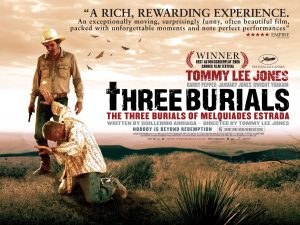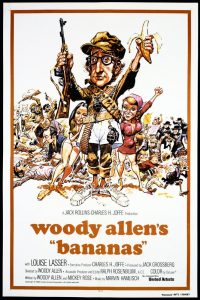 The opening scene of this movie immediately situated the audience in a very different world than the previous films shown in this class. One of violence, corruption, and even more so, disturbing acts of terrorism. As the camera panned around this house filled with suffocated bodies stuffed into the walls of the rooms, I imagined that we were about to start watching a horror movie. This film by far depicts Latin America in the most violent manner. The sense of corruption and fear portrayed in the town of Juarez through the procession of images of mutilated bodies was gut wrenching.
The opening scene of this movie immediately situated the audience in a very different world than the previous films shown in this class. One of violence, corruption, and even more so, disturbing acts of terrorism. As the camera panned around this house filled with suffocated bodies stuffed into the walls of the rooms, I imagined that we were about to start watching a horror movie. This film by far depicts Latin America in the most violent manner. The sense of corruption and fear portrayed in the town of Juarez through the procession of images of mutilated bodies was gut wrenching.
However, even though the violence is in a sense “worn on the sleeve” of Juarez, I think this film does a good job of situating America within the violence related to the war on drugs. By this I am referring to the fact that, although the multi-unit task force that Kate joins in the film seems to have some “good” intentions (ie. minimizing the amount of drug cartels that America has to deal with), they go about attaining this goal through a manner of corrupt and illegal actions. As the viewers are moved further and further through the film, we become aware of just how far this CIA led task force is willing to go to get their way – by joining up with Alejandro, a man from the Colombian drug cartel, in order to help them get rid of a Mexican one. I think the mentality of this task force / Kate’s supervisor Matt, is to rid themselves of the worse of two evils, but at the end of the film, I feel that viewers are left wondering what right America has to assert their dominance in the way shown in this film.
One of the most interesting things I observed about this film, was the way “real” action/justice was depicted as requiring a level of illegality. For example, in many of Matt’s convincing speeches with Kate, he references how her work with the state department is just mitigating the trickle down effect of the drug cartels, whereas his task force/ the CIA aims to hit the cartels at the source. This assumption made Kate’s regular work in some ways seem quite useless and manipulated her into pursuing further engagements with this task force. By the end of the film, we have seen the lengths that this group is willing to go to fulfill its objectives, but I think the audience and Kate are left feeling the sense of, “at what cost?” I felt a sense of confusion over whether anything had really been improved at all considering the objective wasn’t really to reduce the amount of drug trade or corruption, but rather just reduce the amount of cartels that were responsible for the corruption.
On a very different topic of gender dynamics, it was interesting to see how Kate was the member of the state department chosen to take up this multi-unit task force. It seemed that her “supervisor” Matt picked her because she was beautiful and single (and therefore an attractive distraction for their task force’s projects), as well it seemed that she was chosen because she was assumed to be more accepting of their illegal actions (as indicated by Matt’s reference to ‘not wanting any lawyers on the task force,’ likely because they would be more likely to report illegal proceedings). Although Kate’s emotional responses to the violence depicted throughout the film did appear to be a natural response, I did feel as though this showed a bit of a gender binary around being able to cope with malicious violence. Whereas it seemed as though the men could somewhat turn off their emotions or were trained out of having them all together.
Overall this was a very interesting film in terms of the relational dynamics between America, Mexico, and Columbia, and its depiction of America’s involvement in the war on drugs.
 characters that we haven’t necessarily seen in our previous films. In the way that Rachel is able to separate her sex life from her husband, yet struggles to understand her own emotions towards Bob and Pete, in the way that Lou Ann requires Mike to murder someone before deciding to leave him, or in the way that Pete is clearly maddened by the death of his friend Mel to the point that he cannot think of anything but bringing him home to his family and bringing justice to his death. I felt as though so many of the characters were struggling to accept realities they knew were true for themselves, and it took some hard hitting moments to face the facts.
characters that we haven’t necessarily seen in our previous films. In the way that Rachel is able to separate her sex life from her husband, yet struggles to understand her own emotions towards Bob and Pete, in the way that Lou Ann requires Mike to murder someone before deciding to leave him, or in the way that Pete is clearly maddened by the death of his friend Mel to the point that he cannot think of anything but bringing him home to his family and bringing justice to his death. I felt as though so many of the characters were struggling to accept realities they knew were true for themselves, and it took some hard hitting moments to face the facts. I must say, the title of this film is very apt. From the scene where Fielding is talking to his therapist about being repeatedly electrocuted as a child by his heated blanket, to his masquerade across San Marcos and becoming their figurehead, to his fantastical, on and off, yet very dry relationship with Nancy, this film could be summed up in one word: bizarre. Yet, beneath its slap stick/ dead pan exaggerated humour (which I didn’t think could coexist, yet arguably function quite well together in this film), I felt that “Bananas” was very successful in poking fun at some of the realities of politics, romance, and society.
I must say, the title of this film is very apt. From the scene where Fielding is talking to his therapist about being repeatedly electrocuted as a child by his heated blanket, to his masquerade across San Marcos and becoming their figurehead, to his fantastical, on and off, yet very dry relationship with Nancy, this film could be summed up in one word: bizarre. Yet, beneath its slap stick/ dead pan exaggerated humour (which I didn’t think could coexist, yet arguably function quite well together in this film), I felt that “Bananas” was very successful in poking fun at some of the realities of politics, romance, and society. president and held a calm composure. He depicted the event as being quite normal, to the point that he went up to talk to the president about it after he had been shot, and finished his conversation by saying something along the lines of ‘well good luck to you.’ In comparison to coverage of American politics, I doubt something like that would ever be shown so publicly on television, especially with such a normalcy to the way the news caster made the event come across. I recognize that this was fictional and exaggerated, but still could be representative of the way in which Americans/Westerners view other societies with more of a gaze of feeling the authority / privilege to invade on their private matters and publicize them with their own perspective attached, which can normalize violence amongst other things in other countries.
president and held a calm composure. He depicted the event as being quite normal, to the point that he went up to talk to the president about it after he had been shot, and finished his conversation by saying something along the lines of ‘well good luck to you.’ In comparison to coverage of American politics, I doubt something like that would ever be shown so publicly on television, especially with such a normalcy to the way the news caster made the event come across. I recognize that this was fictional and exaggerated, but still could be representative of the way in which Americans/Westerners view other societies with more of a gaze of feeling the authority / privilege to invade on their private matters and publicize them with their own perspective attached, which can normalize violence amongst other things in other countries.